| Artist |
Robert Plant; Alison Krauss |
| Album Title: |
Raising Sand |
| Album Cover: |
 |
| Primary Genre |
Folk: Contemporary Folk |
| Format |
CD |
| Released |
10/23/2007 |
| Label |
Rounder Records |
| Catalog No |
11661-9075-2 |
| Bar Code No |
0 11661-9075-2 2 |
| Packaging |
6 Panel Digipack With Sleeve |
| Tracks |
| 1.
|
Rich Woman (4:04)
|
| 2.
|
Killing The Blues (4:16)
|
| 3.
|
Sister Rosetta Goes Before Us (3:26)
|
| 4.
|
Polly Come Home (5:36)
|
| 5.
|
Gone Gone Gone (Done Moved On) (3:33)
|
| 6.
|
Through The Morning, Through The Night (4:01)
|
| 7.
|
Please Read The Letter (5:53)
|
| 8.
|
Trampled Rose (5:34)
|
| 9.
|
Fortune Teller (4:30)
|
| 10.
|
Stick With Me Baby (2:50)
|
| 11.
|
Nothin’ (5:33)
|
| 12.
|
Let Your Loss Be Your Lesson (4:02)
|
| 13.
|
Your Long Journey (3:55)
|
|
| Date Acquired |
08/31/2019 |
| Personal Rating |
 |
| Acquired from |
Electric Fetus - Duluth |
| Purchase Price |
5.39 |
Web Links |
All Music Guide entry:
Discogs entry:
Musicbrainz entry: |
Notes |
Issued in a 6 panel Digipak-style package with a cardboard slipcase (O-card)
Recorded at Sound Emporium, Nashville, TN; Electro Magnetic Studios, Los Angeles, CA; The Village Recorder, Los Angeles, CA; Sage & Sound, Hollywood, CA.
Mixed at Electro Magnetic Studios, Los Angeles, CA.
Mastered at Lurssen Mastering, Hollywood, CA.
Publishing details:
track 1: © 1955 Sony/ATV Songs LLC / Venice Music (BMI)
track 2: Graph Music (ASCAP)
track 3: © Eden Bridge Music (ASCAP). Administered by Bug Music
track 4: © 1969 Irving Music, Inc. (BMI)
track 5: © 1964 Sony/ATV Songs LLC / Acuff Rose Music (BMI)
track 6: © 1969 Irving Music, Inc. (BMI)
track 7: BMG Songs (ASCAP) / BMG Music Publishing International Ltd. (PRS) / Sons of Einion Limited (PRS) / Succubus Music Ltd. (PRS). All rights for the US on behalf of BMG Songs. Administered by BMG Songs.
track 8: Jalma Music (ASCAP)
track 9: © 1962 renevew 1990 Unart Music Corporation. Rights assigned to EMI Catalogue Partnership. All rights controlled and administered by EMI Unart Catalog Inc., (BMI).
track 10: © 1960 Universal-Cedarwood Pub. (BMI)
track 11: © 1970, 1999 (renewed) JTVZ Music (ASCAP) / Katie Belle Music (ASCAP) / Will Van Zandt Publishing (ASCAP). Administered by Bug.
track 12: © 2000 Trice Publishing Co. (BMI) administered by Bug.
track 13: © Hillgreen Music (BMI)
On digipak:
© & ℗ 2007 Rounder Records Corp.
On disc:
℗ & © 2007 Rounder Records Corp.
Manufactured in the USA.
Art Direction, Design – Steven Jurgensmeyer
Coordinator [Project Coordination For Robert Plant] – Nicola Powell
Edited By – Jason Wormer
Engineer [Additional Engineering] – Jason Wormer, Stacy Parrish
Engineer [Assistant Engineer] – Alex Pavlides, Emile Kelman, Kyle Ford, Vanessa Parr
Management [Alison Krauss] – DS Management
Management [Production Manager: Assistant] – Lisa Surber
Management [Production Manager] – Ivy Skoff
Management [Robert Plant] – Trinifold Management
Mastered By – Gavin Lurssen
Photography By – Pamela Springsteen
Photography By [Band Photograph] – Russ Harrington
Producer – T Bone Burnett
Recorded By, Mixed By – Mike Piersante
Technician [Guitar Technician] – Curtis Laur, Paul Ackling
Copyright © – Rounder Records Corp.
Phonographic Copyright (p) – Rounder Records Corp.
Published By – Sony/ATV Songs LLC
Published By – Venice Music
Published By – Graph Music
Published By – Eden Bridge Music
Published By – Irving Music, Inc.
Published By – Acuff Rose Music
Published By – BMG Songs
Published By – BMG Music Publishing International Ltd.
Published By – Sons Of Einion Ltd.
Published By – Succubus Music Ltd.
Published By – Jalma Music
Published By – Unart Music Corp.
Published By – EMI Catalogue Partnership
Published By – Universal Cedarwood Publishing
Published By – JTVZ Music
Published By – Katie Belle Music
Published By – Will Van Zandt Publishing
Published By – Trice Publishing Co.
Published By – Hillgreen Music
Recorded At – Sound Emporium
Recorded At – Electro Magnetic Studios
Recorded At – The Village Recorder
Recorded At – Sage & Sound
Mixed At – Electro Magnetic Studios
Mastered At – Lurssen Mastering
Made By – EDC, USA
Barcode (Scanned): 0011661907522
Barcode (Text): 0 11661-9075-2 2
Matrix / Runout (Variant 1): 116 619 0752 01@ H ['EDC' logo]
Mastering SID Code (Variant 1): IFPI L006
Mould SID Code (Variant 1): IFPI 0367
----------------------------------------------------------------------------------------------
Analyzed Folder: Robert Plant + Alison Krauss - Raising Sand_dr.txt
----------------------------------------------------------------------------------------------
DR Peak RMS Filename
----------------------------------------------------------------------------------------------
DR7 -0.20 dB -8.34 dB 01 - Rich Woman.flac
DR6 -0.20 dB -7.35 dB 02 - Killing The Blues.flac
DR7 -0.20 dB -9.13 dB 03 - Sister Rosetta Goes Before Us.flac
DR8 -0.20 dB -10.64 dB 04 - Polly Come Home.flac
DR7 -0.20 dB -7.98 dB 05 - Gone Gone Gone (Done Moved On).flac
DR8 -0.10 dB -9.40 dB 06 - Through The Morning, Through The Night.flac
DR7 -0.20 dB -9.42 dB 07 - Please Read The Letter.flac
DR8 -0.20 dB -10.73 dB 08 - Trampled Rose.flac
DR7 -0.20 dB -8.98 dB 09 - Fortune Teller.flac
DR8 -0.20 dB -9.71 dB 10 - Stick With Me Baby.flac
DR7 -0.20 dB -10.26 dB 11 - Nothin'.flac
DR6 -0.20 dB -7.85 dB 12 - Let Your Loss Be Your Lesson.flac
DR10 -0.30 dB -13.32 dB 13 - Your Long Journey.flac
----------------------------------------------------------------------------------------------
Number of Files: 13
Official DR Value: DR7
----------------------------------------------------------------------------------------------
|
|
| Reviews |
AllMusic Review by Thom Jurek:
What seems to be an unlikely pairing of former Led Zeppelin vocalist Robert Plant and bluegrass superstar Alison Krauss is actually one of the most effortless-sounding duos in modern popular music. The bridge seems to be producer T-Bone Burnett and the band assembled for this outing: drummer Jay Bellerose (who seems to be the session drummer in demand these days), upright bassist Dennis Crouch, guitarists Marc Ribot and Burnett, with Greg Leisz playing steel here and there, and a number of other guest appearances. Krauss, a monster fiddle player, only does so on two songs here. The proceedings are, predictably, very laid-back. Burnett has only known one speed these last ten years, and so the material chosen by the three is mostly very subdued. This doesn't make it boring, despite Burnett's production, which has become utterly predictable since he started working with Gillian Welch. He has a "sound" in the same way Daniel Lanois does: it's edges are all rounded, everything is very warm, and it all sounds artificially dated. Sam Phillips' "Sister Rosetta Goes Before Us" is a centerpiece on this set. It has her fingerprints all over it. This tune, with its forlorn, percussion-heavy tarantella backdrop, might have come from a Tom Waits record were it not so intricately melodic -- and Krauss' gypsy swing fiddle is a gorgeous touch. There is an emptiness at the heart of longing particularly suited to Krauss' woodsy voice, and Plant's harmony vocal is perfect, understated yet ever-present. It's the most organically atmospheric tune on the set -- not in terms of production, but for lyric and compositional content. Stellar.
Plant's own obsession with old rockabilly and blues tunes is satisfied on the set's opener, "Rich Woman," by Dorothy LaBostrie and McKinley Miller. It's all swamp, all past midnight, all gigolo boasting. Krauss' harmony vocal underscores Plant's low-key crooned boast as a mirror, as the person being used and who can't help it. Rollie Salley's "Killing the Blues" is all cough syrup guitars, muffled tom toms, and played-in-bedroom atmospherics. Nonetheless, the two vocalists make a brilliant song come to life with their shared sorrow, and it's as if the meaning in the tune actually happens from the bitter irony in the space between the two vocalists as the whine of Leisz's steel roots this country song in the earth, not in the white clouds reflected in its refrain. There are a pair of Gene Clark tunes here as well. Plant is a Clark fan, and so it's not a surprise, but the choices are: "Polly Come Home" and "Through the Morning, Through the Night" come from the second Dillard & Clark album from 1969 with the same title as the latter track. The first is a haunting ballad done in an old-world folk style that Clark would have been proud of. It reflects the same spirit and character as his own White Light album, but with Plant and Krauss, the spirit of Celtic-cum-Appalachian style that influenced bluegrass, and the Delta blues that influenced rock, are breached. "Through the Morning, Through the Night" is a wasted country love song told from the point of view of an outlaw. Plant gets his chance to rock -- a bit -- in the Everly Brothers' "Gone Gone Gone (Done Moved On)." While it sounds nothing like the original, Plant's pipes get to croon and drift over the distorted guitars and a clipped snare; he gets to do his trademark blues improv bit between verses. To be honest, it feels like it was tossed off and, therefore, less studied than anything else here: it's a refreshing change of pace near the middle of the disc. It "rocks" in a roots way.
"Please Read the Letter" is written by Plant, Page Charlie Jones, and Michael Lee. Slow, plodding, almost crawling, Krauss' harmony vocal takes it to the next step, adds the kind of lonesome depth that makes this a song whispered under a starless sky rather than just another lost love song. Waits and Kathleen Brennan's "Trampled Rose," done shotgun ballad style, is, with the Phillips tune, the most beautiful thing here. Krauss near the top of her range sighs into the rhythm. Patrick Warren's toy piano sounds more like a marimba, and his pump organ adds to the percussive nature of this wary hymn from the depths. When she sings "You never pay just once/To get the job done," this skeletal band swells. Ribot's dobro sounds like a rickety banjo, and it stutters just ahead of the bass drum and tom toms in Bellerose's kit. Naomi Neville's "Fortune Teller" shows Burnett at his best as a producer. He lets Plant's voice come falling out of his mouth, staggering and stuttering the rhythms so they feel like a combination of Delta blues, second-line New Orleans, and Congo Square drum walk. The guitar is nasty and distorted, and the brush touches with their metallic sheen are a nice complement to the bass drums. It doesn't rock; it struts and staggers on its way. Krauss' wordless vocal in the background creates a nice space for that incessant series of rhythms to play to.
The next three tunes are cagey, even for this eclectic set: Mel Tillis' awesome ballad "Stick with Me Baby" sounds more like Dion & the Belmonts on the street corner on cough syrup and meaning every word. There is no doo wop, just the sweet melody falling from the singers' mouths like an incantation with an understated but pronounced rhythm section painting them singing together in front of a burning ash can. This little gem is followed by a reading of Townes Van Zandt's "Nothin'" done in twilight Led Zeppelin style. It doesn't rock either. It plods and drifts, and crawls. Krauss' fiddle moans above the tambourine, indistinct and distorted; low-tuned electric guitars and the haunted, echoing banjo are a compelling move and rescue the melody from the sonic clutter -- no, sonic clutter is not a bad thing. The weirdest thing is that while it's the loudest tune on the set, it features Norman Blake on acoustic guitar with Burnett. This is what singer/songwriter heavy metal must sound like. And it is oh-so-slow. The final part of the trilogy of the weird takes place on Little Milton Campbell's "Let Your Loss Be Your Lesson," a jangly country rocker in the vein of Neil Young without the weight and creak of age hindering it. Krauss is such a fine singer, and she does her own Plant imitation here. She has his phrasing down, his slippery way of enunciating, and you can hear why this was such a great match-up. The band can play backbone slip rockabilly shuffle with their eyes closed and their hands tied behind their backs, and they do it here. It's a great moment before the close. The haunting, old-timey "Your Long Journey by A.D. and Rosa Lee Watson," with its autoharp (played by Mike Seeger no less), Riley Baugus' banjo, Crouch's big wooden bass, and Blake's acoustic guitar, is a whispering way to send this set of broken love songs off into the night. These two voices meld together seamlessly; they will not be swallowed even when the production is bigger than the song. They don't soar, they don't roar, they simply sing songs that offer different shades of meaning as a result of this welcome collaboration.
|
|
| Cover 1 |
 |
| Cover 2 |
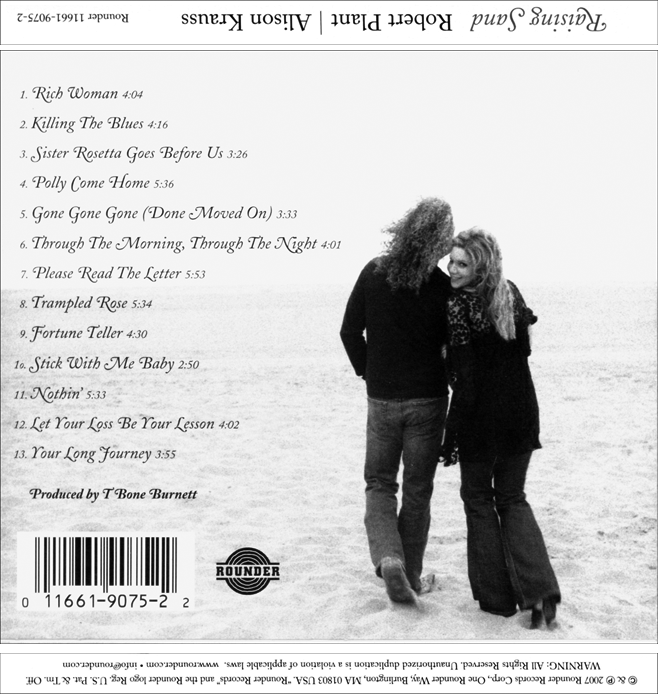 |
| Cover 3 |
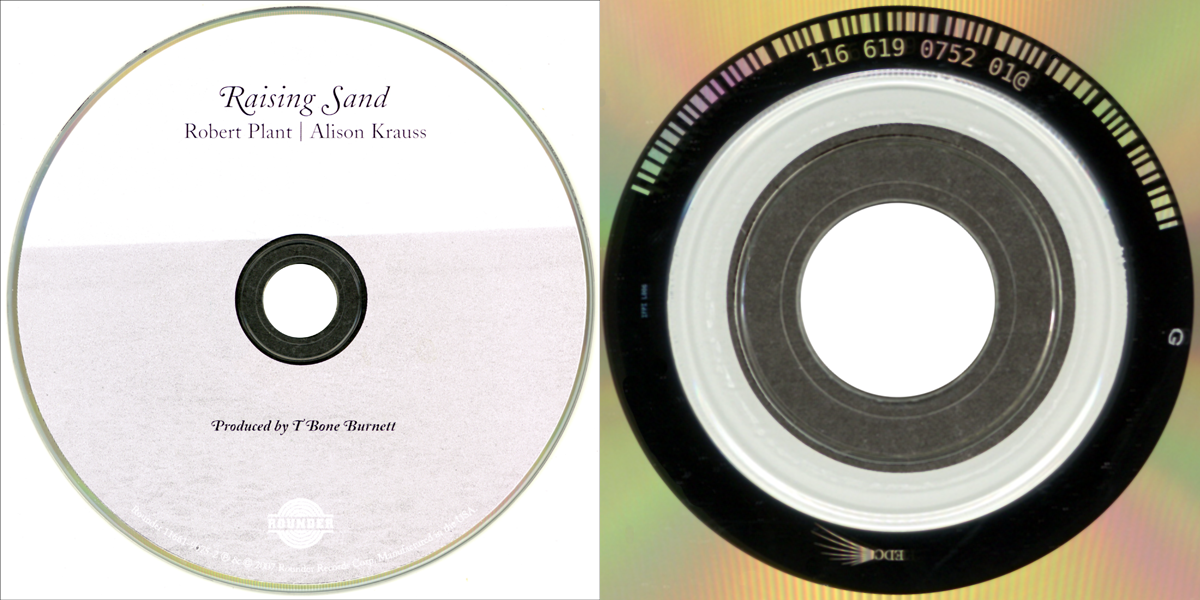 |
| Cover 4 |
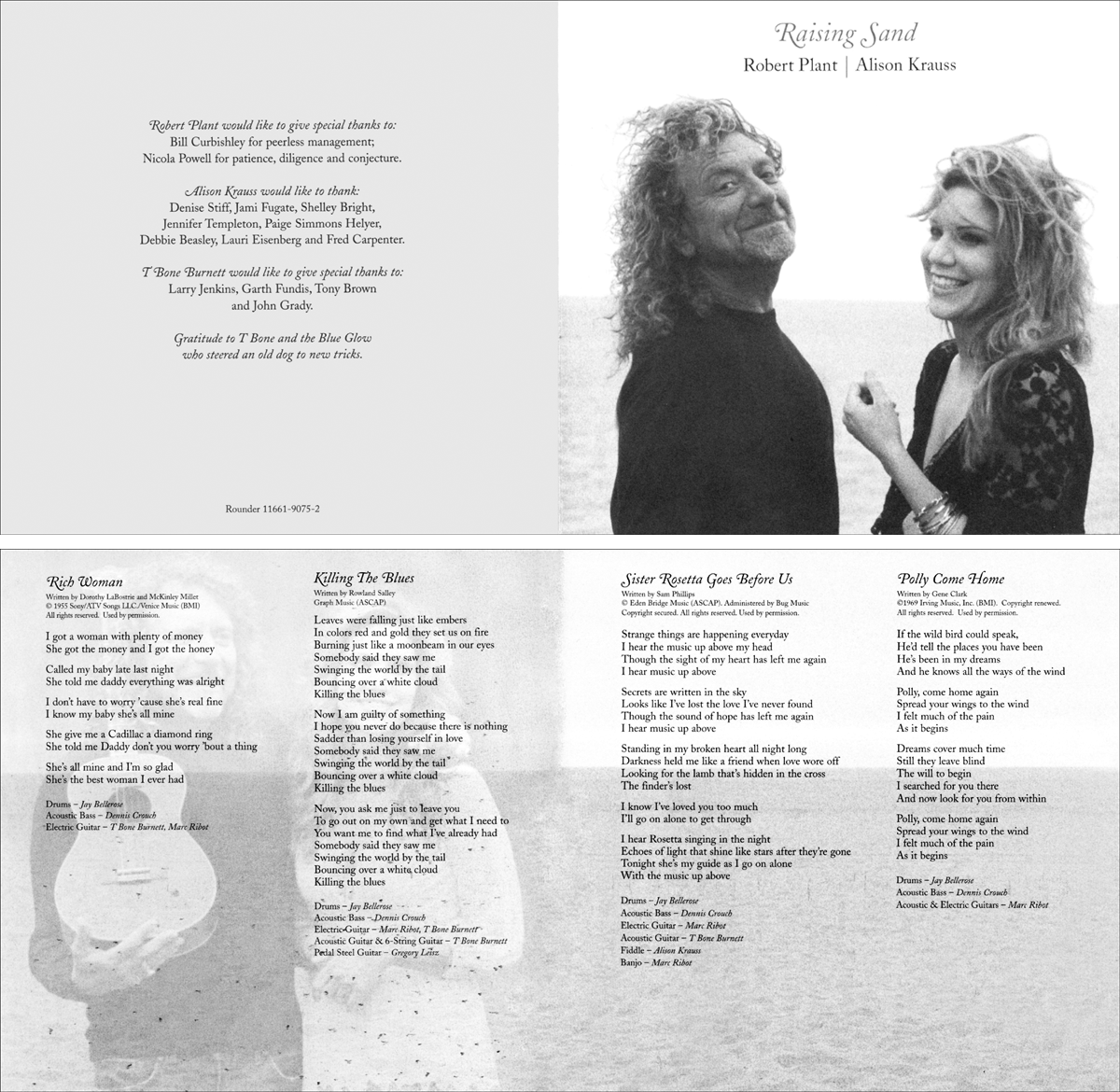 |
| Cover 5 |
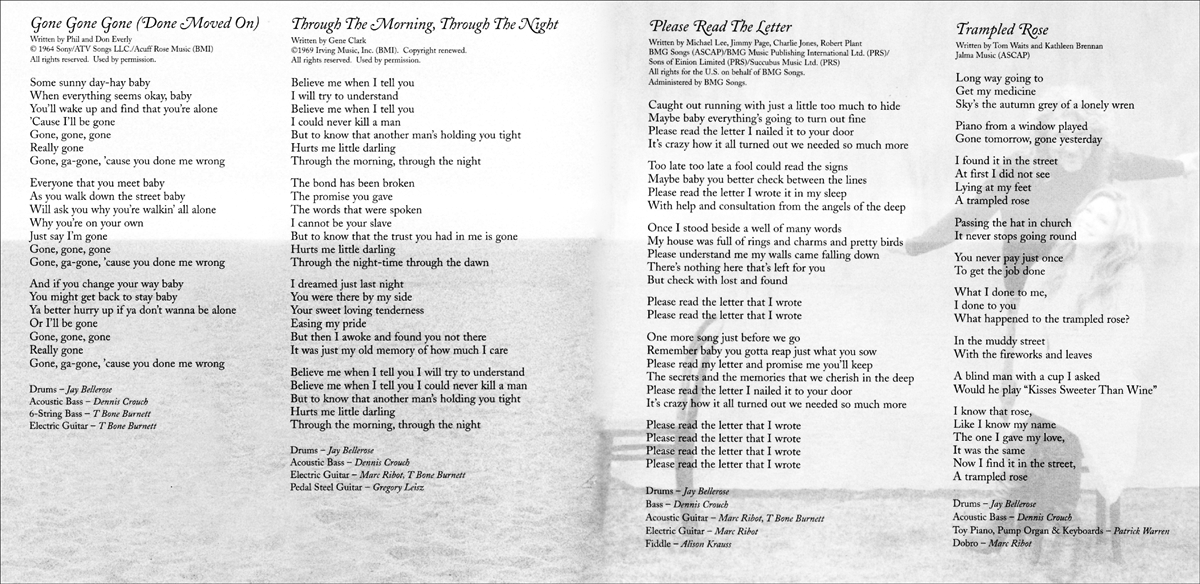 |
| Cover 6 |
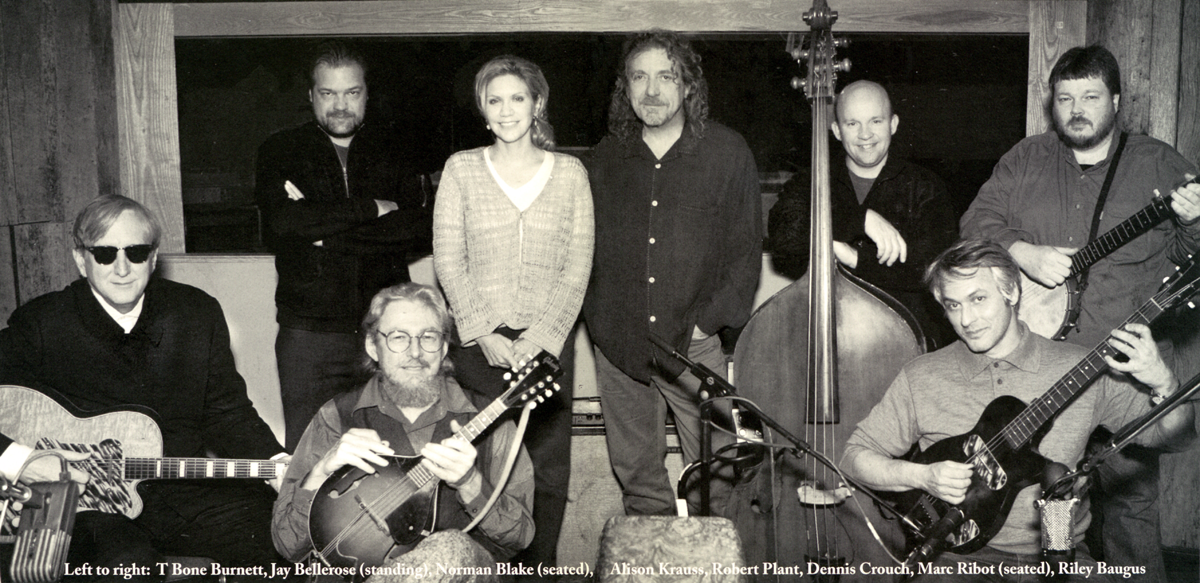 |
| Cover 7 |
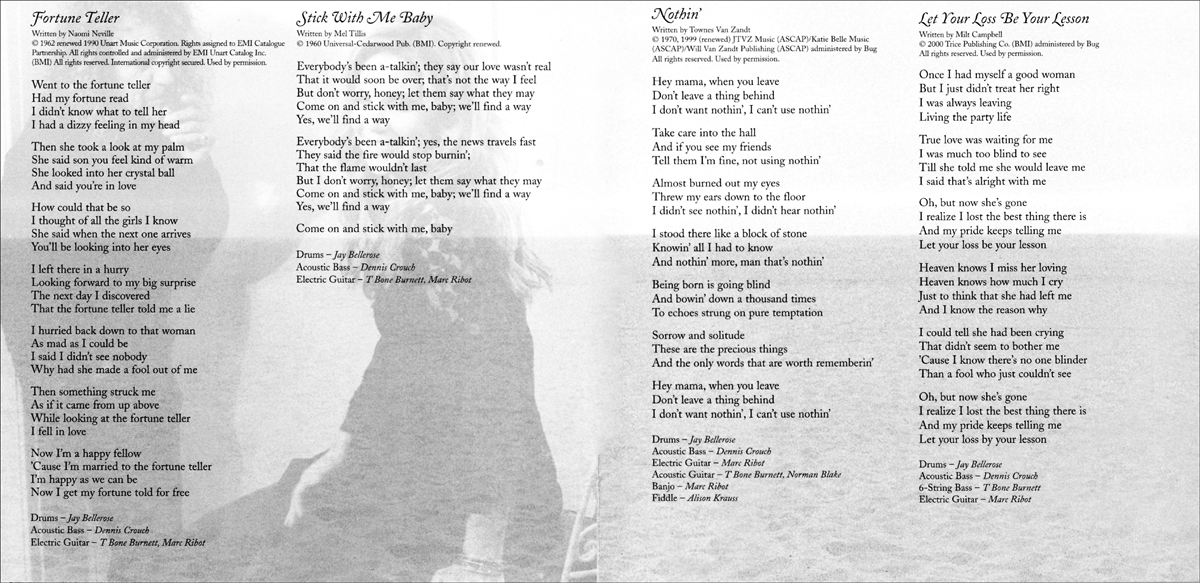 |
| Cover 8 |
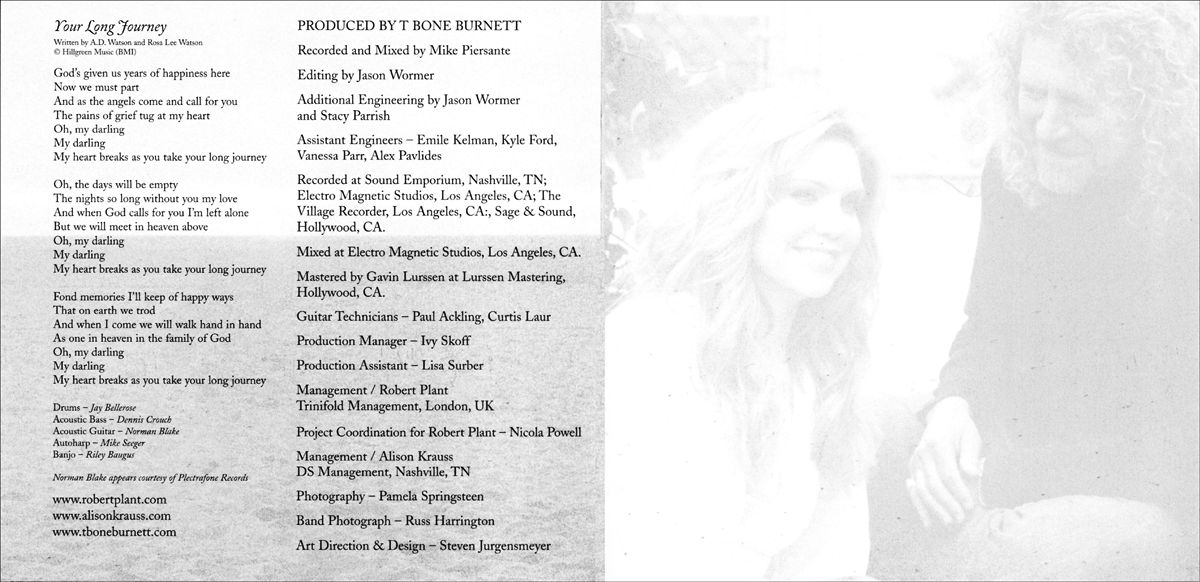 |
| Cover 9 |
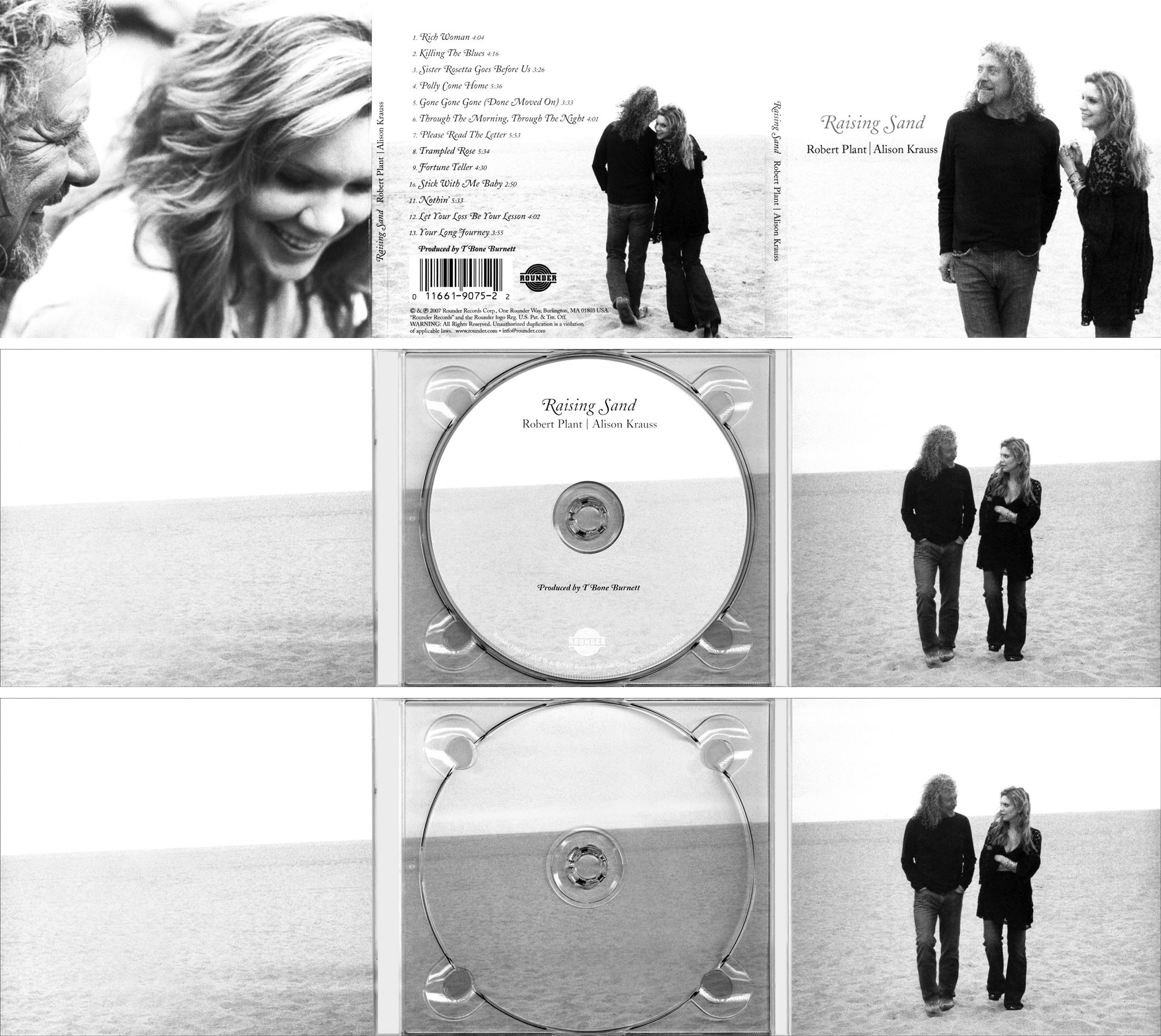 |
|











